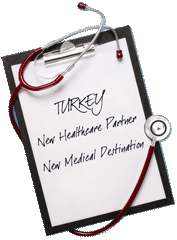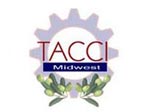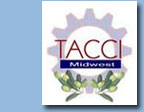Turkish American Chamber of Commerce & Industry - Midwest
Proudly Presents
MODEL PARTNERSHIP IN HEALTHCARE: UNITED STATES AND TURKEY

NEW Healthcare Partner
NEW Medical Destination
MEDICAL TOURISM
The phenomenon of receiving healthcare abroad has grown over the past several years. Due to increasing healthcare costs at home, more and more Americans and Europeans are traveling abroad seeking medical treatment, which is commonly referred to as “medical tourism”. Medical travel, health tourism, or global healthcare are also commonly used terms for this practice. People are now choosing to receive healthcare in places where they can receive comparable or better quality treatment at lower costs. They prefer shorter or no waiting periods and quicker access. Currently the world medical tourism industry is estimated to amount over $60 billion and is expected to exceed over $100 billion within the next two years.
The Deloitte 2008 Survey of Health Care Consumers had predicted that outbound medical tourism will experience an explosive growth over the following three to five years. In 2007, 750,000 Americans traveled abroad for treatment. Estimates for 2008 were 1 million, for 2009 were 3 million, and for 2010 over 6 million Americans were expected to travel abroad for medical treatment in search of better prices, better quality, better access and better availability. Extended recession and the economic downturn slowed down this expected exponential growth substantially as consumers started delaying non-urgent elective medical procedures and treatments during 2008 and 2009. The number of outbound patients were well below 1 million both years. Based on economic slowdown and other factors, Deloitte revised these estimates in 2009, and announced their recession-adjusted estimates for 2010 as a little under 1 million patients. Nevertheless, starting in 2010, they predict a sustainable annual growth of 35% with and estimate of 1.6 million patients by 2012.
Current US statistics show that over 47 million Americans have no medical insurance and over 120 million Americans do not have dental insurance. In search of value and quality, this uninsured population has no choice but to travel to foreign countries to receive lower-cost medical or dental treatment alternatives when they need them. 18% of the remaining insured population (i.e. of 250 million) are either underinsured or do not qualify for certain treatments which results in substantial out-of-pocket costs when a procedure is done in the US. For this population the outbound medical tourism represents an opportunity to save on huge out-of-pocket expenses. Medical care abroad can save up to 90% of the cost of comparable care in the US. Even for those who are properly insured, the cost of a procedure abroad including air fare and hotel accommodation could add up to a less amount than the plan deductible. According to Economic Times, if 10% of the insured American population were to take the advantage of treatments abroad, then the insurance industry could gain about $14 billion annually.
For US patients, medical traveling will remain as a viable alternative in light of dramatically rising health care costs, an aging population, increasing number of uninsured and underinsured population, higher plan deductibles, higher co-pays, increasing number of employers who are cutting back and eliminating their healthcare programs, and the ease of traveling abroad and communication. Willingness of existing health plans, insurance providers and employers to search for alternative means to reduce costs will further impact medical traveling positively.
For patients traveling to Turkey, elective procedures such as liposuction, orthodontics, lasik, rhinoplasty, breast augmentation as well as complex specialized procedures such as cardiovascular surgery, brain surgery, orthopedic joint (knee & hip) replacements can result in savings of up to 75%- 90% as compared to what they cost in the US and in Europe. Among other procedures for which patients travel abroad are medical oncology, hematological oncology, radiation oncology, Cyberknife, kidney dialysis, prostate operations, organ transplants (heart, kidney, liver, pancreas, small intestine, bone marrow), in vitro fertilization treatments and fertility operations, dental treatments and surgery; eye operations; plastic, reconstructive and cosmetic surgeries.
Medical tourism has the potential to offer substantial benefits and opportunities to American and global patients, employers, service providers, insurance companies, and the economy as a whole. Countries with comparative cost and quality advantage could be the solution to global health care crisis. The industry needs well established global networks and partnerships. If quality, patient safety, pre-operative, post-discharge, and follow-up care are given top priority, risks are well managed, certain industry standards are established and followed by medical tourism facilitators, and if the industry leaders such as JCI and MTA continue playing their crucial role in educating the industry, ensuring the quality of healthcare and patient safety, and promoting the transparency, then the medical travel industry could benefit all.
WHY TURKEY?
The Turkish American Chamber of Commerce & Industry - Midwest is proud to organize the Chicago conference to educate and inform the participants on current issues and trends facing the global healthcare and medical tourism industry, while introducing Turkey as a new healthcare partner and an emerging medical destination. Turkey is a destination where you will feel at home while experiencing world famous Turkish hospitality. Bordering eight different countries from Europe, Asia, and the Middle East, Turkey has a unique and strategic geographical location forming a bridge between the continents. For thousands of years it has been the cradle to more civilizations than any other country in the world. You will be able to combine your medical trip for top quality, affordable health care with a variety of short vacation and tourism opportunities in a culturally and historically rich environment to make it a more relaxing experience. Turkey is ready to be an important player and partner in this rapidly growing industry.
With its top quality medical, spa, wellness, and thermal facilities and five-star hotel accommodations in Istanbul, Ankara, Izmir, Antalya and other major cities, Turkey has already been attracting patients from Europe and other countries such as England, Holland, Ukraine, Romania, Kosovo, Bulgaria, Azerbaijan, Russia and Bahrain. Over the last decade or so, the Turkish health industry has been undergoing substantial economic and infrastructure developments and improvements, and Turkey is now ready to play the leading role in the global healthcare industry with its high quality infrastructure. Turkey's JCI accredited medical facilities are affiliated with top tier US providers such as Harvard Medical School, Johns Hopkins Medicine, etc. They are equipped with the latest technology and hardware and US trained, Board certified, highly qualified and experienced doctors and well trained medical personnel. There are no waiting periods for treatment.
Safety and quality are the most important concerns for medical travelers, and accreditation gives consumers confidence with respect to comparable quality of care they receive abroad. Almost all Turkish hospitals have the ISO 2001 quality management certification, and currently 32 of these facilities are JCI accredited while others are in the process of accreditation. This is the largest number of Joint Commission International accreditation any country has achieved so far. To see the list please click here. Turkish Accredited Hospitals Association (TAHA), oversees the maintenance and coordination of the highest quality standards among its JCI accredited members which include Anadolu Medical Center (Affiliated with John Hopkins International), Acibadem Healthcare Group (Affiliated with Harvard Medical International), Bayindir Hospitals, Florence Nightingale Hospital Group, Guven Hospital, Hisar Intercontinental Hospital, International Hospital, Kent Hospital, Memorial Healthcare Group, Mesa Hospital, Universal Hospital Group, and Yeditepe University Hospital. To learn more about TAHA members and the Turkish healthcare industry in general you may also visit www.healthinturkey.org supported by the Foreign Economic Relations Board of Turkey (DEIK) Healthcare Committee and TAHA.
The 2010 conference aims to present the partnership opportunities and solutions Turkey's healthcare industry offers in light of current healthcare crisis in the U.S. and globalization in the world. The event is organized with the support from the Turkish Ministry of Tourism and Culture, the Turkish Ministry of Health, the Turkish Accredited Hospitals Association, the Foreign Economic Relations Board Healthcare Committee (DEIK/TAIK), the Turkish American Doctors Association of Midwest (TADAM) and Turkish Airlines Inc.
To learn more about the medical tourism industry potential in Turkey please contact us at info@MedicalTourismInTurkey.org.


